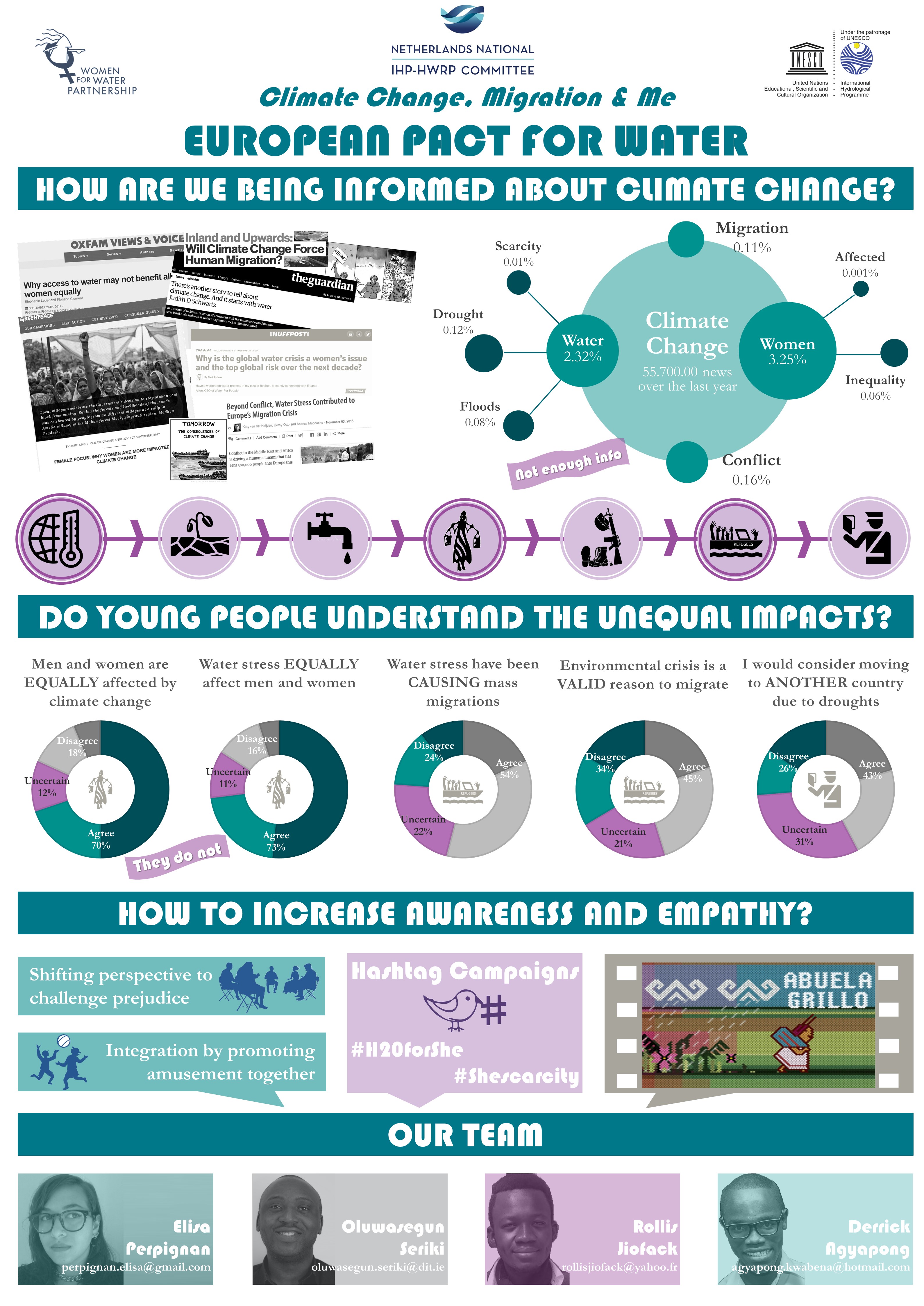For the Challenge Climate Change, Migration and Me, we wanted to investigate young European people awareness regarding some of the consequences of climate change, especially on climates refugees and on how women are more affected by water scarcity. We wanted to find out who knows, who understands, and who cares. We had one month to research the publications related to these issues, apply questionnaires and interview young European people.
In the questionnaire, we used 12 statements with a Likert scale as choice, to identify where their understanding had a broken link. Some of the statements used were:
- There is NOTHING society can do about climate change. It is already too late.
- Environmental crisis is NOT a valid reason to moving to another country.
- I would consider moving to ANOTHER country if my region starts to be affected by droughts.
- Water scarcity and floods have been CAUSING mass migrations.
- Rich and poor countries are EQUALLY affected by climate change.
- Water scarcity and floods EQUALLY affect men and women.
We published our questionnaire online using PsyToolkit. We considered 140 answers from young people (18-34 years old) and we concluded that the lack of knowledge occurred especially on how climate change and water stress can affect people in different ways.
We interviewed some students of TU Delft to check their level of awareness. Some of the questions were:
- How often do you think about climate change?
- Do you think women living in poor countries would be more affected by climate change than men would?
- Do you remember reading about climate refugees on the news?
- Can you see the relation between water scarcity and mass migrations?
- What do you think would help migrants to integrate more with the residents?
These interviews showed us that young people seem to lack empathy towards the most affected groups by the climate change. To show a contrast of experiences, we also interviewed young people from Burkina Faso, an African country hugely affected by water scarcity. We focused on the answers of young women about how water stress increase gender inequality, and how we could be more empathetic towards migrants.
We then performed a media analysis (using Epictions and Ncapture softwares) to see how frequent these themes were being presented to the public. We concluded that the media is not sharing enough, as these themes represent less than 5% of the discussion about climate change. All our efforts were summarized in the video produced for the challenge.
After addressing the problem – lack of awareness about the women situation, and lack of empathy towards climate refugees – we discussed some possibilities to change this scenario. Our pitch for the final event of the Challenge was presented during the International Water Week, in Amsterdam.
Our suggestions were wide, including popularization of movies and cartoons depicting women stories about water scarcity (Abuela Grillo, The Source, Even the Rain), hashtag campaigns to share personal stories (#H2OforShe, #Shescarcity), and the promotion of events with games and sports usually unknown to Europeans. Some of the modalities includes the African strategy board games Mankala and Umlabalaba, and the Asian sport Sepak Takraw, just to name a few.
The idea behind these events was to bridge the gap and channel empathy by focusing on some of the refugees traditions. The integration through games like these would add to the young people culture. It would make the refugees feel valued, facilitate relaxing moments to help the migrants overcoming their previous situation, moreover, it would contribute to the bonding between refugees and residents by imprinting a good feedback associated with happiness hormones, like endorphins and serotonin, released during the events. After all, empathy is not related to rationality and, therefore, policies focused solely on practical and pragmatic issues are destined to be ineffective, as we witness nowadays.
This Challenge was deeply important to change our mindset regarding climate change. We were too comfortable reading sporadically about this, but not necessarily acting. We noticed how easy it is to ignore situations far from our sight. We cannot forget how all of us need to adapt somehow, because climate change is global, and so must be the adaptation.
Elisa Perpignan




